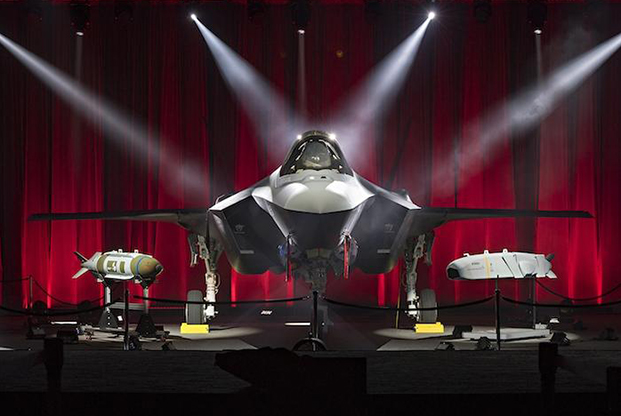Turkey’s expulsion from the F-35 Joint Strike Fighter program is overdue and should be expedited, regardless of the cost, according to a July 6 letter from four senators to Defense Secretary Mark T. Esper. The lawmakers say delays in kicking Turkey out of the F-35 supply chain are making the U.S. look weak and are hampering diplomatic efforts to restrain Russian arms sales while economic sanctions are in place.
Sens. James Lankford (R-Okla.), Thom Tillis (R-N.C.), Jeanne Shaheen (D-N.H.), and Chris Van Hollen (D-Md.) aired their frustration that the Pentagon isn’t complying with the sense of Congress that Turkey’s role as a supplier of F-35 parts, which the Pentagon agreed would end early this year, will actually continue for another two years.
Legislation passed by Congress and signed by President Donald J. Trump demanding that Turkey abandon plans to buy Russia’s S-400 air defense system sent Turkey a “clear diplomatic message,” the senators wrote, but “that message is being undermined by the [Defense] Department’s repeated delays in removing Turkey from the supply chain.” That this situation continues two years after the statute went into force, and beyond the Pentagon’s own deadline to oust Turkey from the F-35 program by March 2020, “is impeding our nation’s diplomatic and geopolitical efforts to pressure Turkey to reverse course,” they said. Turkey is also reportedly shopping for a Russian-made fighter like the Su-35 to replace Lockheed Martin’s F-35.
The U.S. and its F-35 partners moved to expel Turkey from the program because that country insisted on buying Russia’s S-400 anti-aircraft defense system. NATO members agreed that operating the F-35 in close proximity to the S-400 would potentially expose vulnerabilities in the jet’s stealth technologies to Russian technicians, which the alliance found unacceptable. Turkey has been asked to abandon the purchase and buy a NATO-made system instead, but has rebuffed those requests from its partners.
Sen. John Thune (R-S.D.) recently inserted language in the Senate’s version of the fiscal 2021 defense policy bill stipulating that if Turkey sold the S-400 to the U.S., it could return to the F-35 program. The U.S. has pushed Turkey to buy the Army’s Raytheon Technologies-built Patriot air defense system instead.
Congress understood from the outset that Turkey’s expulsion would “create additional expense for the Department and taxpayers,” but that this is a necessary evil “in order to preserve the integrity of the program and affirm our nation’s diplomatic commitments under NATO,” the senators wrote. Congress wanted Turkey’s ouster in “months, not years,” they said, and now wants Esper to explain who permitted more parts orders beyond February 2020 and why the Pentagon isn’t acting to immediately implement lawmakers’ directives.
The Senators also demanded a list of all active contracts with Turkish manufacturers—not specifying those on just the F-35 program– the dates they went into force, and when they expire. Turkey is technically subject to the Countering America’s Adversaries Through Sanctions Act (CAATSA), which calls for economic penalties against countries buying “significant” military hardware from Russia, but the Trump administration has not enforced it. President Trump has indicated he does not want to sour a good personal relationship with Turkish President Recep Tayyip Erdogan, and said Erdogan was “treated very unfairly” by NATO.
Pentagon acquisition and logistics chief Ellen Lord announced last year that the global partnership would begin to “unwind” Turkey from the F-35 program. However, the March deadline to do so came and went without a full expulsion.
Turkish defense industry director Ismail Demir said May 7 the expulsion order was meaningless because the U.S. was still buying F-35 parts from Turkey, and the country’s companies were still producing and delivering them.
Last week, a Pentagon spokeswoman said Turkey will continue to make more than 100 parts for the F-35’s propulsion system alone, as well as wiring harnesses and brackets and center fuselage assemblies, through 2022.
“The F-35 program sought to avoid costly, disruptive and wasteful contract terminations in this matter,” the spokeswoman said. “We have made substantial progress in the stand-up of the alternate sources to support the demand for parts … and continue to execute to our plan.” The spokeswoman did not immediately comment on the senators’ letter.
Turkey has paid for six complete F-35 jets, but they remain in the U.S. and the Pentagon has said they will not be delivered to Turkish soil. Where they will end up is still undecided, but the Senate Armed Services Committee version of the Fiscal 2021 National Defense Authorization Act contains language that they be provided to the U.S. Air Force, and modified for USAF service if necessary. Turkey had planned to purchase 100 F-35s, which would have made it one of the largest operators of the jet after the U.S. Air Force.
In addition to the F-35, Turkey makes parts for the F-16 fighter and many other defense programs. Under CAATSA, those contracts would be in jeopardy. Bloomberg previously reported Turkey was hoarding parts for its own fleet of around 250 F-16s in case spare parts are cut off by the U.S.
